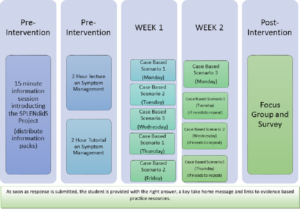Dr Clare Mc Veigh, Susan Carlisle, Matt Birch and Dr Helen Kerr
School of Nursing and Midwifery, Queen’s University Belfast
Join the EBN Twitter Chat on Wednesday the 6th February 2019, 8-9pm UK time which will be hosted by Dr Claire McVeigh, a Lecturer at the School of Nursing and Midwifery, Queen’s University Belfast. It will focus on The SPLENdidS Study which investigated the delivery of symptom management education in a university setting to first year undergraduate nursing students through mobile spaced learning.
Participating in the Twitter chat requires a Twitter account; if you do not already have one you can create an account at www.twitter.com. Once you have an account contributing is straightforward, you can follow the discussion by searching links to #ebnjc (the EBN chat hash tag) and contribute by sending a tweet (tweets are text messages currently limited to 140 characters), you need to add #ebnjc to your tweet as this allows everyone taking part to view your tweets.
The SPLENdidS Study aimed to explore the feasibility of delivering symptom management education in a university setting to first year undergraduate nursing students through mobile spaced learning. The spaced learning intervention (figure 1) involved 3 case based symptom management scenarios, and multiple choice questions, being delivered directly to consenting participants’ (n=27) in a spaced, repeated, and tested format over 2 weeks. Post intervention, participants completed an online survey (n=12) and a focus group (n=8). Data were analysed using descriptive statistics and thematic analysis. Students viewed digital spaced learning as an acceptable education platform that enhanced their learning in relation to holistic symptom management. Participants perceived that this intervention improved their engagement with educational material and provided optimal and effective feedback. However findings additionally displayed that digital learning is perceived as being complimentary to traditional teaching methodologies, and not a replacement. This method of learning has the potential to increase knowledge retention and student engagement. This study lends itself to further interventional research and provides in depth information regarding the implications of introducing this model into undergraduate nurse education.
Spaced Learning Intervention
Questions to think about ahead of the Twitter Chat
– What challenges did students identify when using this particular spaced learning platform?
– What potential does this digital spaced learning platform have in relation to knowledge retention?
– What particular learning did students gain in relation to symptom management?
– How does this particular form of learning fit with the new NMC standards for pre-registration nurse education?
– What are the implications for future research?
– What impact could this potentially have for patients and their carers?
We look forward to chatting to you online!

